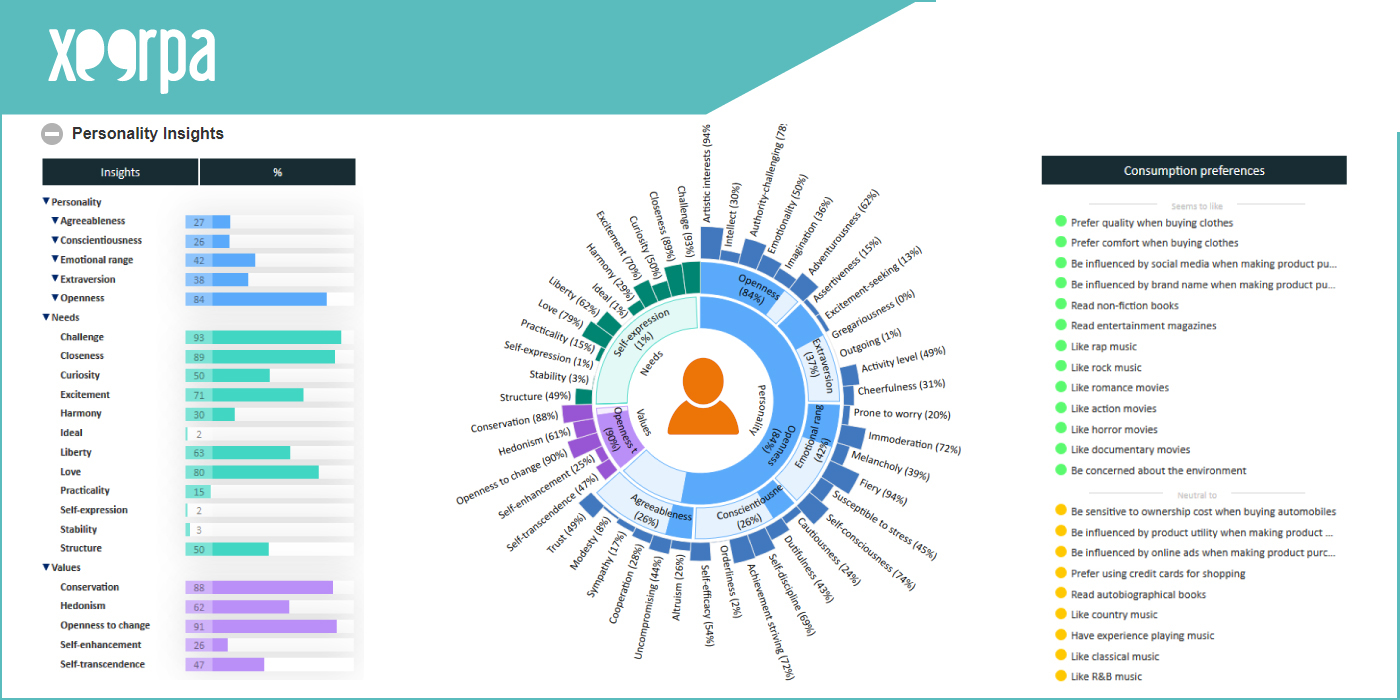Xeerpa now includes AI-based Personality Insights analytics, providing a complete analysis of not only the interests, hobbies, favourite products and brands or geo-locations of each user, now combined with an in-depth analysis of her/his personality and consumption preferences, allowing for an even more advanced personalisation in marketing campaigns.
Customers are at the center of any business and knowing who your customers are and what they want is key to product and service placement. Of course, what people want, why, and when is a tricky question to answer, one which has puzzled and intrigued thinkers for centuries. Psychologists have been studying why we do what we do for a while now and they often use something called the Big Five or five factor model to describe just how we interact with the world.
So what are the Big Five traits anyway? Sometimes they’re called OCEAN for short: Openness to experience, Conscientiousness, Extraversion, Agreeableness, and Neuroticism. The higher the degree of Openness, the more willing you are to engage in new and intense experiences and take risks. Less and the more you’re focused on routines, perhaps more pragmatic. The more conscientious you are, the less you’ll jump on a last minute plan and the more dutifully or reliably you’ll act. Extraversion measures how outgoing or reserved you are; agreeableness measures how cooperative or antagonistic. Neuroticism, or emotional range, measures how much you react emotionally to your environment.
The WPI model also incorporates and studies a person’s “needs” and “values”. There are 12 “needs” (excitement, curiosity, harmony, ideal, closeness, self-expression, liberty, love, practicality, stability, challenge, structure) which can be used to identify what parts of a certain product or service will speak most to a person.
The “values” analyse the reasons a person marshals when making a decision, such as to buy or not to buy. There are five of them used in the model: self-transcendence or helping others (shows concern for the welfare and interests of others); conservation/tradition (emphasizes self-restriction, order, and resists change); hedonism/taking pleasure in life (seeks pleasure and sensuous gratification); self-enhancement/achieving success (seeks personal success); open to change/excitement (emphasizes independent action, thought, and feeling, and displays a readiness for new experiences).
Watson can draw up a personality chart for a certain person (independent of their age, gender, or culture) through a textual analysis of words they have written, either a running text or their social media feeds. This melding of linguistic analysis and psychological modelling can produce very specific personality profiles for customers without going through lengthy personality tests which necessarily have smaller samples. All the model needs to get to work are at least 100 words and voilà!
With this information in hand you can find out your customer’s consumption preferences and deepen your relationships, honing even more your approach. The preferences are divided into eight categories: shopping, music, movies, reading and learning, health and activity, volunteering, interest in the environment, and entrepreneurship.
Xeerpa Personality Insights can offer us a lot of information about our customers. Combined with Xeerpa’s dashboard, you can see all the probabilities divided into just three groups: Seems to like, Neutral, Seems not to like. You’ll find you know more about your customers than they do about themselves!


